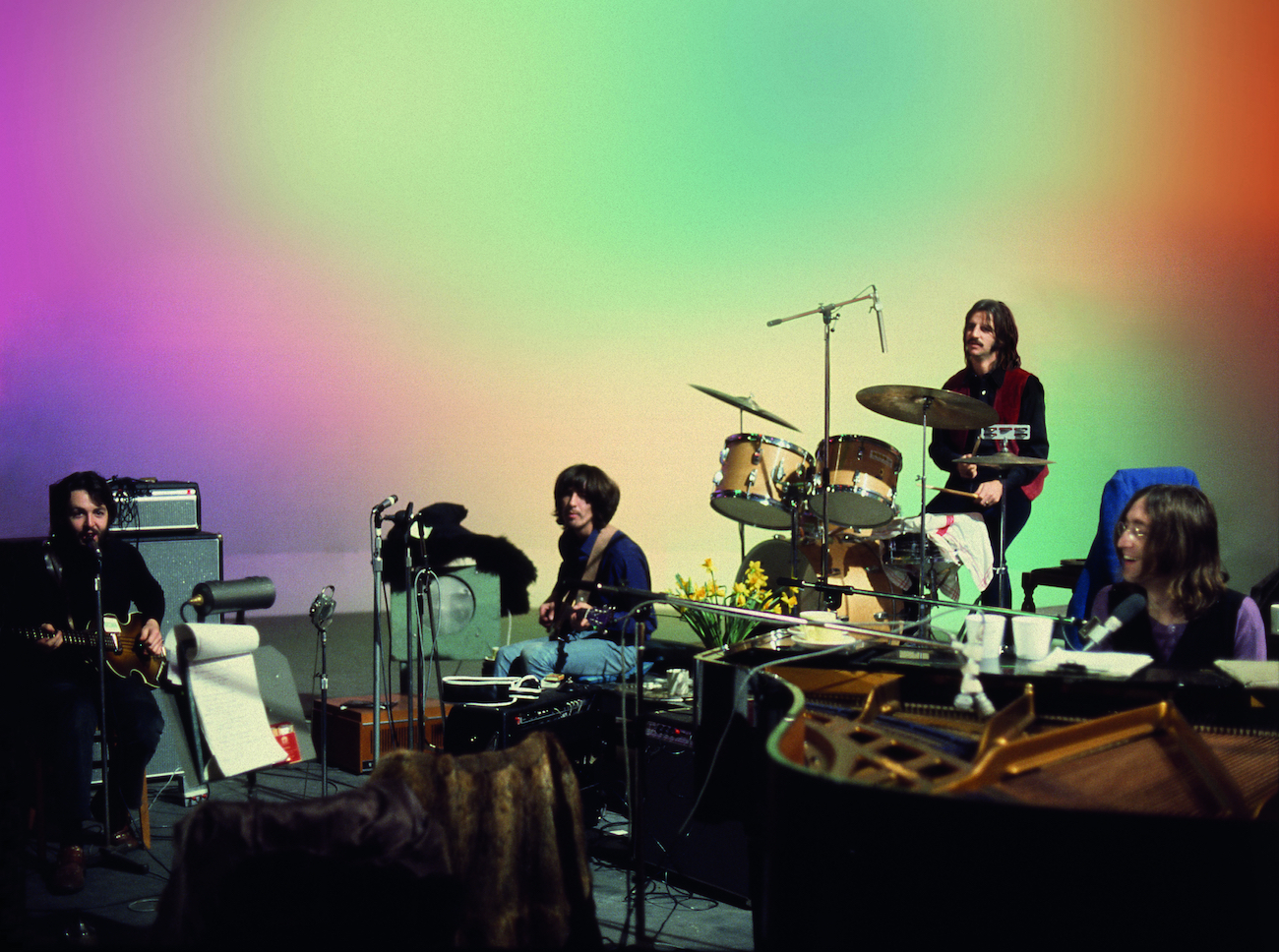Peter Jackson’s ‘The Beatles: Get Back’ Foreshadowed 2 Major Events in The Beatles’ History
If you watched Peter Jackson’s new documentary, The Beatles: Get Back, closely, then you may have picked up some interesting things about The Beatles. However, some may not realize that the documentary foreshadowed two major events in the group’s history. Publisher Dick James talks to Paul McCartney about the band’s catalog in one scene. John Lennon tells George Harrison that Allen Klein is a genius in another.
Both of these men would soon have The Beatles’ destiny wrapped around their fingers.

Dick James was in Paul’s ear as The Beatles rehearsed at Twickenham Studios
In Part 1 of Jackson’s documentary, Paul, Ringo, and director Michael Lindsay-Hogg sat with The Beatles’ publisher, Dick James, going through some songs he’d recently purchased with Northern Songs. “4,000 songs is a lot to absorb,” James said. “This is a very good list. That’s the entire catalog up to ’65,” he continued. “All of these are ours?” Paul asked.
“Is this the catalog that’s just gone on sale?” Lindsay-Hogg asked. “It’s the one we just bought,” James said. “Yeah, Nothern Songs. Which includes Paul and John.” Paul slipped in, “Just about.” “What do you mean, ‘Just about’?” James asked. “No comment,” Paul replied.
James continued to say they would reprint the music for sheet music because of the expanding market. He also explained how The Beatles checked for mistakes on their sheet music.
When George arrived, Ringo asked him if he wanted to see “what you have half of a percent of?” “Not really,” he replied. Privately, James told Paul they had to pay a high price for the new catalog.
It was a small moment, but it spoke volumes.
James becomes something of a villain for the band
While The Beatles felt indebted to James for being a key figure in kick-starting their careers, he also eventually became something of a villain to them.
In 1963, James was new to the music publishing world, but he was hungry to be The Beatles’ publisher. To wow the band’s manager, Brian Epstein, he organized the group’s first TV performance on Thank Your Lucky Stars.
First, James earned the rights to Please Please Me. Then, he suggested he and Epstein start a separate company called Northern Songs, which would house the entire Beatles catalog. Epstein and The Beatles signed the necessary contracts “not really knowing what it was at all about,” Paul said (per Beatles Bible).
“We said to them, ‘Can we have our own company?’ They said, ‘Yeah.’ We said, ‘Our own?’ They said, ‘Yeah, you can. You’re great. This is what we’re going to do now.’ So we really thought that meant 100 percent owned. But of course, it turned out to be 49 percent to me and John and Brian, and 51 percent to Dick James and Charles Silver,” Paul explained.
James and Silver actually owned 25 percent each, while John and Paul had 20 percent each, and Epstein 10 percent. So, essentially, James made way more money off The Beatles’ songs than they were. In 1969, they lost complete control of the rights to their catalog when James sold his share of Nothern Songs without offering John and Paul the chance to buy him out. Years later, the catalog would end up in the hands of Michael Jackson.
John spoke very highly of Allen Klein after their initial meeting
We don’t see Allen Klein, but he’s very much a key figure in The Beatles: Get Back and in the rest of the band’s days together. In Part 3 of Jackson’s documentary, John told George that he’d met with Allen Klein, the manager of The Rolling Stones, and they’d talked until two in the morning.
John spoke very highly of Klein. He said, “He knows everything about everything. Very interesting guy… He even knows what we’re like. The way he described each one of us, you know, and what we’ve done and what we’re gonna do and that.”
However, Glyn Johns, The Beatles’ recording engineer, told John that Klein was very strange yet clever.
There was a reason why John told this to George and not Paul.
The drama with Klein is part of the reason why The Beatles broke up
When The Beatles met with Klein, Ringo, who was never really opinionated, said Klein was a “conman who’s on our side for a change.” Later on, John, George, and Ringo voted to have Klein as the band’s manager. Therefore, Paul’s idea of having his new brother and father-in-law, John and Lee Eastman, as managers was outvoted.
It was an unfortunate mistake because, as the LA Times wrote, Klein proved to be “somewhere between sleazy and outright crooked.” The decision to proceed with Klein became one of the key factors in The Beatles’ demise.
So, as the New York Times pointed out, Jackson’s documentary might not show The Beatles splitting up, but it definitely does a good job of showing all the factors that would eventually lead to it.
“Jackson’s film makes clear that the end was nigh,” they wrote. “If there is a true culprit in the breakup, it was the business conflicts that ensued during 1969, when the group tussled over its management, and Lennon and McCartney tried but failed to take control of the company that held their songwriting rights.”
“Our movie doesn’t show the breaking up of the Beatles,” Jackson said, “but it shows the one singular moment in history that you could possibly say was the beginning of the end.”


